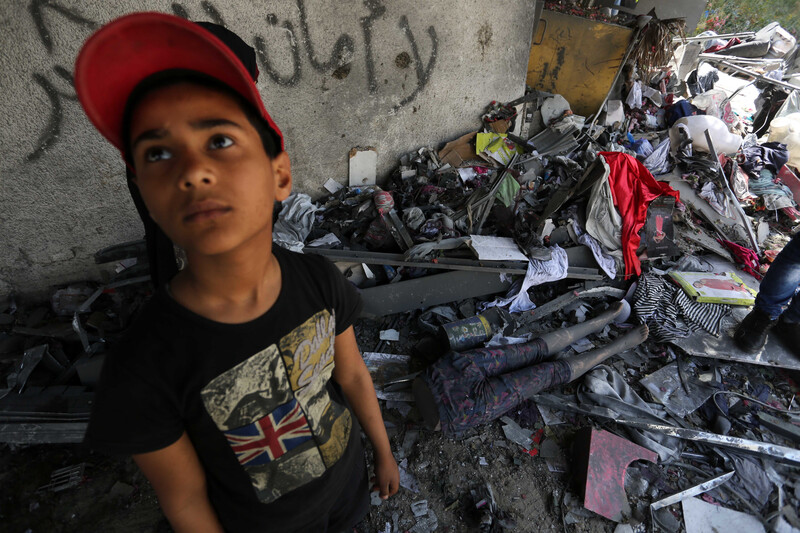The Electronic Intifada 28 May 2019

A Gaza City clothing shop destroyed in an Israeli strike, 5 May.
APA imagesEarlier this month, I went shopping so that my baby son Khalil would have something new to wear for the holiday of Eid. It never occurred to me that the store where I bought his clothes would be attacked one day later.
Run by Husam al-Haddad, it was one of many shops and offices located in Gaza City’s al-Khuzundar building. On 4 May, Israel fired four missiles at the building, which also hosted a Turkish charity aiding Palestinian orphans.
The attack was a “real disaster,” according to al-Haddad. He had spent $90,000 buying new stock ahead of Eid.
“We were already living in difficult economic conditions,” he said. “With this, we’re totally destroyed.”
Five people were employed in his store.
One of them, 23-year-old Muhammad Jarada, took a call from an Israeli number five minutes before the attack. The caller said he was part of the Israeli military and warned that the building must be evacuated within 60 seconds.
“We ran around 50 meters from the building,” said Jarada. “The Israeli officer called me again and told me to go further away. We followed the instructions and ran some more. Then the first missile fired from a drone hit the entrance of the building.”
Jarada received a third call from the same man, telling him to move even further back.
“There was a crowd of people in the area,” Jarada added. “I shouted at them to run away more but they didn’t listen to me. Suddenly, another three drone missiles hit the building and the crowd started to move away. And after another three minutes a missile fired from an F-16 [warplane] hit the building and it collapsed.”
Jarada is studying education at the Islamic University of Gaza. Finding alternative work is a tall order as Gaza’s unemployment rate exceeds 50 percent.
“I cannot believe that I’m jobless now,” Jarada said. “I used to support my family and pay my university fees from this work. Now I feel like I’m nobody.”
“Helpless”
Amjad Jaber managed a neighboring store that sold sneakers.
As soon as he heard the warning to evacuate, Jaber left everything behind and ran. “I didn’t have time to think about anything but saving my life at that moment,” he said. “But when I saw the destruction of the building, I realized that I had lost all my money and source of living. I felt helpless. I wished that I stayed inside and died.”
Jaber estimates that he lost $100,000 as a result of the attack. Two of his workers were made unemployed.
Ten stores in the al-Khuzundar building were destroyed by Israel, with another 37 damaged.
The attacks were part of an offensive ordered by Benjamin Netanyahu, the Israeli prime minister. With bitter irony, Netanyahu has long claimed to be an advocate of “economic peace.”
The nearby Capital Mall was also harmed by Israel’s weapons on the same day. Approximately 90 percent of the services offered by that shopping center in Gaza City have halted as a result.
A car wash within the mall was completely wrecked during the offensive. It had employed 15 people, most of them married men with families to support.
Muhammad Abu Ali, a 25-year-old law graduate, worked as a supervisor in the car wash. He was unable to find other employment after finishing his studies in Gaza’s Al-Azhar University.
“I have nothing on the horizon,” he said. “I see emigration as the only solution.”
Abu Ali has been in love with a woman for the past few years and had planned to make a marriage proposal soon. He has now decided against doing so because of his perilous financial situation.
“It seems that I’ll never be able to be with the woman I love until I find the right job or manage to emigrate,” he said.
A number of small companies were affected, too, by Israeli actions carried out on 5 May – one day after the al-Khuzundar building and Capital Mall were attacked.
They included a hairdressing salon located within the Abu Qamar building, also in Gaza City.
“In one moment, I lost everything,” said Ihab Dughmush, a 48-year-old who had opened the salon five months earlier. “It seems that Israel wants to destroy businessmen in Gaza.”
Sarah Algherbawi is a freelance writer and translator from Gaza.




